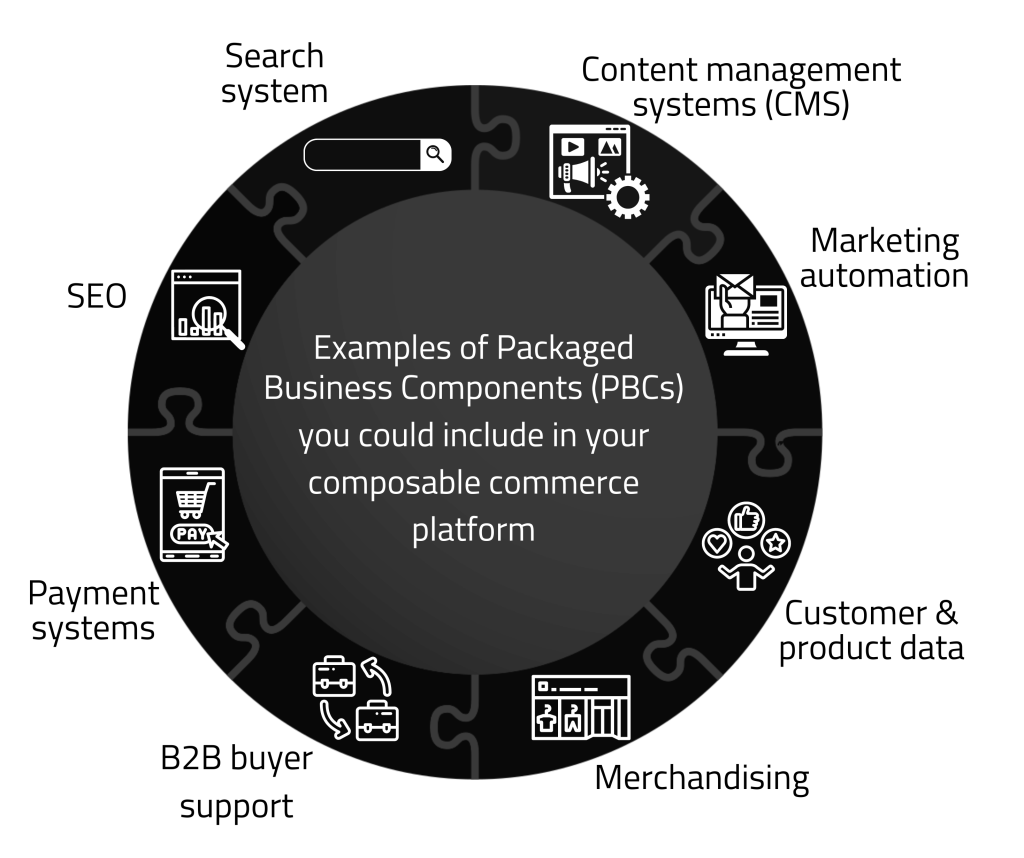Factor Blue / Composable commerce
Composable commerce is the game-changer of the e-commerce industry. It allows developing and managing online sales with more speed, flexibility, personalization and customization. With this API-driven ecosystem, businesses can create unique customer experiences and journeys that are tailored to their specific needs. The essence of composable approach is the separation of backend from frontend, coupled with gathering data from different applications in a headless manner. It is also known as a building block solution, since it consists of multiple PBCs.
Unlike traditional e-commerce platforms, composable commerce is made up of modular components.
In other words, it can easily be assembled, rearranged, and adapted to meet customer needs and market trends. Connecting new platforms, using data from other applications and flexible integration of marketing tools are features that make composable commerce an attractive approach.
By using open-source components and APIs, businesses can avoid vendor lock-in. This allows them to select the best tools and services for specific needs. Moreover, it reduces the cost and effort required to integrate with other systems and tools.
Adjustability enables custom commerce solutions that meet specific needs, with the ability to adapt and evolve over time as the needs and requirements change.
By using modular components, businesses can reduce the complexity and cost of building and maintaining their commerce systems. Additionally, they can easily add, remove, or modify components as needed, which can help to streamline processes and improve overall efficiency.
The design of composable commerce allows it to be highly integrable with a variety of other systems, including marketing and customer relationship management (CRM) tools. For example, CRM tools can store customer data, such as purchase history, preferences, and feedback. This optimization allows targeted promotions and personalized content on the online store.
Creating a tailored and customized online store provides customers with a seamless and efficient shopping experience. Multiple payment and customer service options, as well as shipping methods, help to meet specific needs and preferences of customers. This can also include mobile-optimized checkout flows, among others.

Composable Commerce from a Headless differ in the usage of PBCs (Packaged Business Components). PBCs are software components developed over a specific business function, consisting of data schema, APIs and a set of services.
To illustrate, PBC can be a shopping cart, a payment option, a search system, and so forth.
In brief, the architecture based on PBCs helps create more user-friendly business solutions.
What empowers brands to assemble best-of-breed solutions using various accelerators, third-party applications, pre-composed solutions, and best practices to meet exact business requirements is – an open ecosystem.
Composable commerce is all about using the best-in-class technology from various vendors. Up against relying on a single vendor to provide a standard functionality that is supposed to work for everyone.
On the whole, scaling complex e-commerce projects is possible to tackle with Composable Commerce development. By streamlining internal operations and relying on ace technology, this platform enables great omnichannel experiences. Besides, an open ecosystem provides several benefits in itself, including community support and collaboration. Furthermore, an open-source technology means a flexible and accessible platform for innovation and integration with other technologies and tools. Composable Commerce typically relies on API-driven architecture, which can make it easier for developers to build complex and scalable e-commerce solutions.
A business would have greater flexibility and control over the functionality and user experience of the online store. Hence, with composable commerce, e-commerce businesses can choose from a range of pre-built or custom components. For instance, such are: payment gateways, shipping methods, tax calculators, and more, and integrate them into their website as needed. This allows for a tailored and optimized commerce experience for both the business and the customer. Additionally, composable commerce enables businesses to easily add, remove, or modify components as their needs change, without having to completely overhaul their entire commerce system.

Without a doubt, we are ready to deliver you an innovative website.